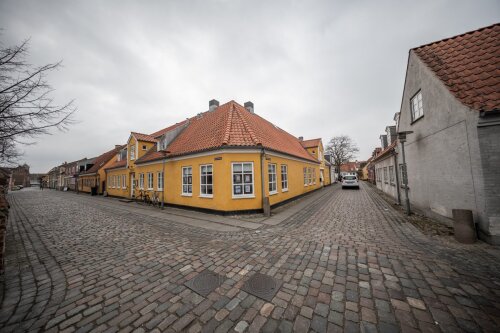Best General Litigation Lawyers in Køge
Share your needs with us, get contacted by law firms.
Free. Takes 2 min.
List of the best lawyers in Køge, Denmark
About Litigation Law in Køge, Denmark
Litigation in Køge, Denmark, refers to the legal process for resolving disputes between individuals, businesses, or organizations through the court system. The process is governed by Danish procedural law and usually takes place in the civil courts, such as the Køge District Court. Litigation can involve a broad spectrum of issues, including contract disputes, inheritance matters, property rights, family law, and commercial conflicts. The goal of litigation is to secure a fair resolution guided by the rule of law, with both parties given the opportunity to present their case before an impartial judge.
Why You May Need a Lawyer
Litigation can be complex, particularly for people who are unfamiliar with Danish legal procedures. Typical situations where legal help may be necessary include:
- Contract disputes between individuals or businesses
- Claims for damages or compensation after an accident or breach of agreement
- Inheritance or probate disagreements
- Family law cases involving divorce, custody, or alimony
- Disagreements over property boundaries or ownership
- Tenancy disputes between landlords and tenants
- Debt collection and enforcement matters
- Employment disputes such as wrongful dismissal or unpaid wages
A lawyer helps ensure that your rights are protected at every stage - from providing legal advice, preparing documents, to representing you in court. Professional legal support can make a significant difference in the outcome of your case.
Local Laws Overview
Litigation in Køge is subject to Danish national laws, especially the Administration of Justice Act (Retsplejeloven), which outlines the court process and procedural rules. Some locally relevant aspects include:
- The Køge District Court is typically the first instance for disputes within the region.
- Mediation is encouraged in civil matters before escalating to full court proceedings.
- Legal aid may be available to those who meet certain financial and case criteria.
- All hearings are generally open to the public unless privacy concerns justify closed proceedings.
- Deadlines and statute of limitations are strictly enforced, so prompt action is crucial.
- Court fees and costs are part of the process - the losing party often bears the legal costs.
- Danish is the official language of the court - foreign parties may need certified translators.
Frequently Asked Questions
What is the first step if I want to start a lawsuit in Køge?
The initial step is to file a statement of claim with the Køge District Court, outlining your case and the relief sought. It is recommended to consult a lawyer to ensure the claim is properly prepared.
Do I always need to go to court to resolve a dispute?
Not necessarily. Many disputes are settled through negotiation or mediation before reaching the courtroom. The court may also suggest mediation as an option during early proceedings.
How long does a typical litigation process take in Køge?
The duration depends on the complexity of the case. Simple matters may be resolved within months, while complex or contested cases can take a year or more.
Can I get legal aid for litigation in Køge?
You may qualify for legal aid if you meet income and asset thresholds and your case has legal merit. Contact the courthouse or a lawyer for eligibility details.
What are the costs involved in litigation?
Litigation costs can include court fees, legal representation, expert witness fees, and other expenses. Usually, the losing party pays the court costs and, sometimes, the other party's legal fees as well.
What language is used in Køge courts?
Danish is the official language in court proceedings. If you do not speak Danish, you may need to arrange for a registered translator or interpreter.
What happens if I lose my case?
If you lose, you may be required to pay the other side's legal costs in addition to your own. Depending on the type of case, you may also have to comply with the court's orders or judgments.
Can I appeal a judgment from the Køge District Court?
Yes, most civil cases decided by the District Court can be appealed to the Eastern High Court, provided certain conditions are met. There are strict deadlines for lodging appeals.
Are court hearings open to the public?
As a general rule, hearings are public. However, the court can decide to close hearings to protect private or sensitive information.
What should I bring to my court hearing?
Bring all documentation relevant to your case, including contracts, correspondence, evidence, and identification. Your lawyer will advise you on any specific requirements for your case.
Additional Resources
Several organizations and government bodies in Denmark can assist with litigation-related questions:
- Køge District Court (Køge Ret) - for procedural inquiries and filing cases
- Danish Bar and Law Society (Advokatsamfundet) - for lawyer referrals and complaints
- Danish Legal Aid (Retshjælp) - offers free or low-cost legal guidance to qualified individuals
- Danish Ministry of Justice (Justitsministeriet) - provides information about legal reforms and procedures
- Mediation Institutes - for alternative dispute resolution options in Køge
Next Steps
If you believe you have a dispute that may require litigation in Køge, Denmark, consider taking these steps:
- Gather and organize all relevant documents and evidence related to your case.
- Consult a qualified lawyer with experience in litigation to obtain professional advice and assess the strength of your case.
- Discuss the possibility of resolving your issue through negotiation or mediation before initiating court proceedings.
- If you proceed to litigation, make sure all court documents and deadlines are strictly observed - your lawyer can manage these aspects for you.
- If cost is a concern, ask your lawyer or the court about eligibility for legal aid.
- Prepare for your hearing by reviewing your case with your lawyer and ensuring you have all necessary documentation ready.
Taking timely action and seeking expert guidance will help you navigate the process efficiently, protect your rights, and improve your chances of a favorable outcome in the Danish legal system.
Lawzana helps you find the best lawyers and law firms in Køge through a curated and pre-screened list of qualified legal professionals. Our platform offers rankings and detailed profiles of attorneys and law firms, allowing you to compare based on practice areas, including General Litigation, experience, and client feedback.
Each profile includes a description of the firm's areas of practice, client reviews, team members and partners, year of establishment, spoken languages, office locations, contact information, social media presence, and any published articles or resources. Most firms on our platform speak English and are experienced in both local and international legal matters.
Get a quote from top-rated law firms in Køge, Denmark — quickly, securely, and without unnecessary hassle.
Disclaimer:
The information provided on this page is for general informational purposes only and does not constitute legal advice. While we strive to ensure the accuracy and relevance of the content, legal information may change over time, and interpretations of the law can vary. You should always consult with a qualified legal professional for advice specific to your situation.
We disclaim all liability for actions taken or not taken based on the content of this page. If you believe any information is incorrect or outdated, please contact us, and we will review and update it where appropriate.










